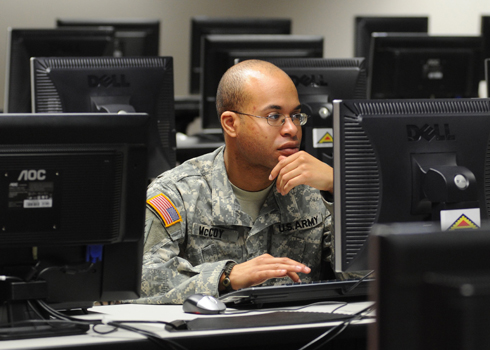More than 400,000 members of the military this week received email surveys about Don’t Ask, Don’t Tell that contained 100 questions ranging from how troops would handle group showers to how knowing your fellow serviceman was gay would affect morale — as though troops weren’t already serving (and, yes, showering with) gay men and lesbian service members.
But like so many of the twists and turns in the Don’t Ask, Don’t Tell saga, the surveys have been met with frustration from the LGBT community and the Pentagon is trying to defend its system as critical to the review process for repealing the Clinton-era policy.
Although some gay rights groups want LGBT troops to boycott the surveys out of concerns that revealing their sexuality could result in more dismissals, Pentagon spokeswoman Cynthia Smith says they are strictly confidential, run by a third-party firm called Westat and hosted on the company’s non-military server.
“Complaints are completely off base,” Smith said in an interview. “We’ve gone to great lengths to ensure that any service member who submits the survey will be protected.” The Pentagon also has set up an “online inbox” for people to submit their thoughts on Don’t Ask, Don’t Tell online. It takes several steps, but service members can get a confidential login for that process as well, also run by Westat. But, as the Denver Post reports, those comments are limited to 1,000 characters – less than 250 words.
However, Smith added that of course, since “the law is still in effect,” officials would need to start the discharge process if someone were to out themselves during the process.
Among the questions, according to CNN:
-Would a repeal of “Don’t ask, don’t tell” prompt a soldier to reconsider serving in the military?
-Would serving under an openly gay commander adversely affect morale?
-How would troops feel about sharing a bathroom or open-air shower with an openly gay comrade in a war zone?
The surveys were sent to about 200,000 randomly selected active-duty troops and 200,000 guard and reservists and the answers will be used to complete the much touted review of the policy banning gays from serving openly in the military. The review is due Dec. 1, though Congress may repeal the policy by then. Critics of largely Democratic efforts to repeal the ban say it shouldn’t be done before the review is complete.
Citizens for Repeal and the Servicemembers Legal Defense Network say that they cannot recommend that LGBT service members answer the questions, because it would in effect out them and risk discharge under the (still enforced) policy. “There is no guarantee of privacy and DOD has not agreed to provide immunity to service members whose privacy may be inadvertently violated or who inadvertently outs himself or herself,” SLDN officials said in a statement.
On the other hand, Servicemembers United, which also represents LGBT troops and veterans, is encouraging the participation of its members. Executive Director Alexander Nicholson, who was himself discharged under the policy, said in a statement, “While Servicemembers United remains concerned about unintentional bias in the question wording within this survey, we are satisfied that sufficient measures are in place to protect the confidentiality of any gay and lesbian servicemember who would like to fully and honestly participate in this survey.”
The the Log Cabin Republicans agree that it’s crucial for service members to fill it out. Army Reservist R. Clarke Cooper, the group’s executive director, wrote a blog post saying he will complete the survey with his personal log on information. “Not doing the survey abdicates terrain to those who want to keep DADT in place,” he wrote.
The Pentagon is keeping the questions secret, but Military Times reviewed a draft copy. According to the paper:
[I]f the draft version is any guide, the general tone of the survey questions — developed by the independent research group Westat in cooperation with the Pentagon — leans toward the potential impact that repealing “don’t ask, don’t tell” might have on unit performance.
That, of course, rests on the assumption that many troops aren’t already out within their units, if not to command.
“We’re trying to get this right,” Joint Chiefs Chairman Adm. Mike Mullen said at a recent briefing sponsored by The Hill when describing the review process.
CNN goes into some detail about the surveys here, and here’s more from Military Times:
In the draft version of the survey, nearly all of the questions were multiple choice, with 23 of 73 questions concerning teamwork, performance and completing the mission, and seven asking about morale. There were questions on leadership challenges; attitudes toward gay co-workers if repeal takes place; the impact of repeal on the respondent’s unit’s ability to complete missions, both deployed and non-deployed; off-duty social impact; and how repeal will affect the spouse’s, family’s or “significant other’s” attitude toward the respondent’s continued military service.
The draft survey also asked how a repeal will affect the respondent’s likelihood of recommending military service to family members or close friends and their own continued service; and whether they personally know any gays, served with any gays and whether they were a leader or co-worker, and how well the unit performed.
The draft survey included a question widely voiced by troops, including those who took part in Military Times focus groups last winter and whose opinions, along with those of gay service members and poll respondents, were the basis of a February story on the potential impact of repeal: “If Don’t Ask Don’t Tell is repealed and a gay or lesbian service member attended a military social with a same-sex partner, which are you most likely to do?”
The Pentagon also plans to survey military families.
Did you get the survey? Drop us a line here. Anonymity guaranteed.









